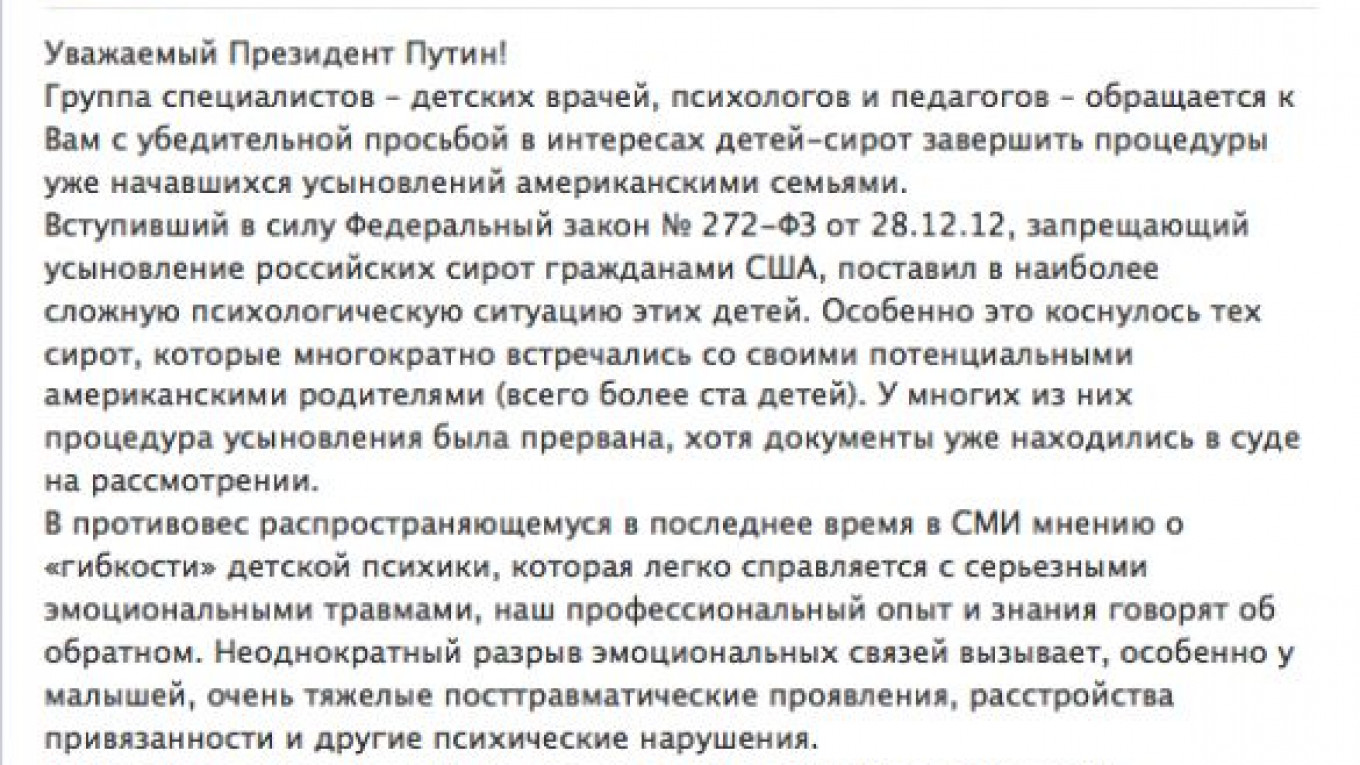A group of top Russian child psychologists, psychiatrists and educators have appealed to President Vladimir Putin to allow about 100 Russian children who were in the final stages of the adoption process to be allowed to join their new U.S. parents.
The open letter says the children had met with the potential parents many times and developed an emotion attachment, but the courts were unable to finalize the adoptions before the government swiftly imposed a ban on U.S. parents adopting Russian children on Jan. 1.
"Even though the media lately have the opinion that a child's mind is 'flexible' and can easily cope with severe emotional trauma, our expertise and knowledge shows otherwise," the letter says. "The repeated disruption of emotional relationships, especially in children, can lead to severe attachment disorder and other psychiatric disorders."
Among the 171 signatories are people who have worked with severely traumatized children, including young survivors of the Beslan school hostage tragedy.
The letter says all the children in question were abandoned by their biological parents, and some had begun the adoption process with more than 10 different Russian parents, only to see it fail. Only then were they put up for international adoption.
"After long meetings with the American adoptive parents, the children have grown emotionally attached to them, managed to learn to love them, and have already begun to perceive them as their own daddies and mommies," the letter says. "It is unacceptable that these little children again have to experience betrayal and abandonment. After such a psychological trauma, they will not be able to trust people, live normally, and successfully develop further."
The letter also notes that many of the children have serious psychological disorders and health problems that require care unavailable in Russia.
The letter, dated April 12, only attracted public attention this week after one of the signatories, cartoonist and former psychiatrist Andrei Bilzho, posted it on Facebook.
The signatories submitted the letter to Putin's televised call-in show on April 25, but it was not mentioned on air. Now they are hoping to gather more signatures before formally sending it to Putin, the BBC's Russian Service reported.
The Kremlin had no immediate comment on the petition. The country is in the middle of an extended May Day public holiday and only returns to work Monday.
Putin has been spending the holiday in his native St. Petersburg, and on Thursday evening he attended a ceremony opening a new stage at the Mariinsky Theater.
The ban on U.S. adoptions is widely seen as the Kremlin's response to a U.S. decision to blacklist Russian officials implicated of human rights abuses. The Kremlin has denied any link, but Ireland announced Thursday that it would not endorse its own blacklist after Russia threatened to halt child adoptions to Irish parents.
A Message from The Moscow Times:
Dear readers,
We are facing unprecedented challenges. Russia's Prosecutor General's Office has designated The Moscow Times as an "undesirable" organization, criminalizing our work and putting our staff at risk of prosecution. This follows our earlier unjust labeling as a "foreign agent."
These actions are direct attempts to silence independent journalism in Russia. The authorities claim our work "discredits the decisions of the Russian leadership." We see things differently: we strive to provide accurate, unbiased reporting on Russia.
We, the journalists of The Moscow Times, refuse to be silenced. But to continue our work, we need your help.
Your support, no matter how small, makes a world of difference. If you can, please support us monthly starting from just $2. It's quick to set up, and every contribution makes a significant impact.
By supporting The Moscow Times, you're defending open, independent journalism in the face of repression. Thank you for standing with us.
Remind me later.






